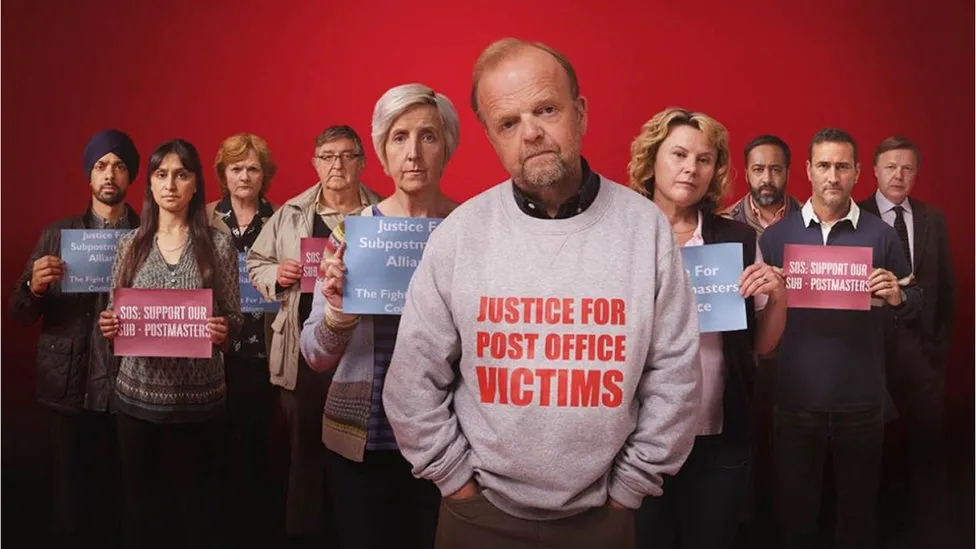Mr Bates vs The Post Office tells the story of one of Britain's 'worst miscarriages of justice'
📺 Watched Mr Bates vs The Post Office.

I’m one of the nearly 15 million folk so far who have tuned into this surprisingly impactful drama-based-on-fact about the battle between ex sub-post-master Mr Bates and his compatriots against the once-respectable British Post Office.
It reveals the ongoing story of what’s now considered to be one of Britain’s worst miscarriages of justice.
Many years ago, in 1999, the Post Office brought in a new computer system called Horizon that it insisted the people who managed each branch of the post office - typically self-employed franchise partners known as sub-postmasters - use to do their accounting, stocktaking, reconciliation and other such financial type stuff. It was developed by a private company, ICL Pathway, who was owned by Fujitsu. Some version of Horizon is still in use today, although I hope it’s not quite the same version for reasons that will become obvious.
For at least some post office branch managers, the day’s takings would frequently fail to reconcile. The computer would tell the person in charge of the branch, the sub post-master, that they appear to have less money on hand than they should do. Their contract stated that they had to make up any shortfall, so Post Office HQ would insist that they pay back the difference out of their own pocket.
The discrepancies could amount to thousands of pounds a day, and so some of the post-masters were understandably reluctant to do so. Many could not even if they wanted to - these are not typically particularly rich people. Some insisted that the computer must be wrong, that there must be bugs in the system. There’s an example of a person who called the helpdesk 90 times and but no useful help was provided.
But when these folk complained about the obvious issues with the computer system they were told that this isn’t possible, the computer is always right and they are always wrong. And besides, they’re the only one who is reporting these problems and no-one other than them has access to the system so it’s obviously something they’re doing. The “something” could include theft.
Both of these claims naturally turned out to be overt lies, although the sub post masters had no way to know that at the time.
And so the Post Office, which has special prosecution powers, started charging them with theft, false accounting and other such charges. All in all, they spent 16 years charging roughly 1 of their formerly respected employees a week, leading to 700 prosecutions. Nearly 300 other sub post masters were prosecuted by other bodies for similar crimes.
Some of these prosecutions resulted in the person accused going to prison. Others were financially or emotionally ruined. They lost their income and life savings. Their communities became distrustful of them. Stress, health issues, family breakdowns occurred. Some plead guilty for lesser offences, taking the offered plea bargain even though they knew they were entirely innocent, too terrified to risk being found guilty of a more serious offence. In a few unbelivably tragic cases the accused postmasters took their own lives.
Rather than hundreds of employees suddenly deciding to become criminals, it it of course turned out that the Horizon computer system did have issues. Worst yet, the Post Office lied about what it knew, disempowering and confusing each of hundreds of complainants in telling them that they were the only one, lying about the capabilities of the system. It went out of its way to not help the post office staff who called the Horizon helpline when the figures didn’t balance, and later to do everything it could to deny the falsely accused, sometimes falsely imprisoned, victims the information they’d need to prove their innocence. Sometimes they explicitly lied to the legal authorities.
The general story has been known to some extent for a while. Concerns were raised by MPs on behalf of their constituents in 2012, more than 10 years ago. The group “Justice for Sub-postmasters Alliance” was set up 3 years before that to sue the Post Office over his issue. In fact Alan Bates, the titular hero of this documentary, first wrote to his Post Office bosses to raise concerns over Horizon fully 24 years ago, in 2000.
To be honest, without looking into it very much I’d foolishly assumed it was a classic story of institutional incompetence and bad technology, of simply trusting the machine too much and having inadequate processes to set things straight. But this documentary strongly suggests that there was far more than that going on. There was deliberate attempts to mislead and victimise the sub postmasters, to smear their names, to lie to them, in order to protect - what? - money? The good name of the Post Office? The ability of the former Post Office CEO to be given the great honour a CBE - becoming a “Commander of the Order of the British Empire” - back in 2019 for “Services to the Post Office”? But whatever it was, it was at the expense of hundreds of innocent people’s lives and wellbeing.
Whilst there has been a rather low-key government enquiry into this matter going on since 2020, it’s only been in very recent times, since this documentary highlighted the injustice so vividly, that the government seems to have made it an actual priority to make some effort to clear the names of and compensate the victims of this corporate malfeasance.
It’s too late for the 59 who already died of course. And it’s hard to know exactly what compensation could make up for the destruction this has caused to many of their lives in the. But this is no excuse for not doing our best to compensate the victims and hold the perpetrators to account.